Question about living next to orchard
Hello!
My husband and I are looking at buying a house{{gwi:9241}} next to a family run orchard that has been in existence for just over 250 years. It's not commercial, it's local. The family{{gwi:807}} there has 3 children. They practice integrated pest management (IPM), & my husband has talked to the owner/farmer and asked about spraying. He does spray, minimally..he says about 8 times a year. Mostly fungicide.
I think this is fine, but am trying to do my due diligence to make sure of the safety of my children, ages 5, 12, &14. The nearest trees are about 400 feet away, we are in hilly country and the orchard slopes away from the house.
We are of course getting the well water tested, with the extra panel for agricultural chemicals.
I haven't been around an orchard when they spray, I assume they want to get most of it on the trees and minimize drift.
I don't have an exact question here, I'm just looking for information from people who know more about this than I do. Is the spraying very intrusive? Dangerous? Any special precautions?
Any information you think is pertinent would be very helpful. I thank you for taking the time to read his over.
Have a great day!
This post was edited by pinkpanther5 on Wed, Dec 10, 14 at 12:41
Comments (57)
pinkpanther5
Original Author9 years agolast modified: 9 years agoMy husband works in the ER as well. He rarely gets sick.
I thought I didn't like honey, until I tasted raw local honey. World of difference there!! I have to buy the big jugs, my family goes thru it like crazy. :-)
He emails the neighborhood when he's going to spray, so we know not to go near the orchards. He also has children. Close to our kids ages (yay), so I think he's pretty cautious. The benefits of living there def out weigh the spraying. IMHO
He's not organic, but uses pesticides judiciously. I think he said Apple scab is one of the things he has to spray for?
Thank you. I have a feeling once we get settled, I'll be visiting this side of the forum more often.
Fun times!
alan haigh
9 years agolast modified: 9 years agoNo, do not assume it will be fine. Around here old orchard land often is contaminated with lead-arsenate which is definitely not cool and hugely reduces the value of the land. Make sure you test the well water for this and any other common agricultural pollutants in the area. The old ones are usually the worst. Lead arsenate was used prior to DDT for a very long time.
Get help from your county extension to find where to test water and what are the pollutants to test for in your area you need to test for.
Related Professionals
Maple Valley Landscape Architects & Landscape Designers · Elgin Landscape Contractors · Commack Landscape Contractors · Desert Hot Springs Landscape Contractors · Indio Landscape Contractors · Lancaster Landscape Contractors · Mendota Heights Landscape Contractors · Methuen Landscape Contractors · Milton Landscape Contractors · Nashua Landscape Contractors · Pleasanton Landscape Contractors · San Bruno Landscape Contractors · Stony Brook Landscape Contractors · Tehachapi Landscape Contractors · Maple Heights Landscape Contractorsken_adrian Adrian MI cold Z5
9 years agolast modified: 9 years agothis will never leave your mind...
find another place ..
its about peace of mind ...
i cant fathom.. that this house is so perfect.. that you cant find another ...
ken
drew51 SE MI Z5b/6a
9 years agolast modified: 9 years agoThe sky is falling, the sky is falling, oh wait that thread was removed (thank goodness!).
You know to me the apples just don't taste the same without the lead-arsenate.I see you are getting the water tested, best test the soil too. Some occurs naturally. Find out where they test for it. Call the local health department and university for info.
It is low risk, most former orchards actually test below dangerous levels. At least according to the state of Wisconsin.
http://datcp.wi.gov/uploads/Environment/pdf/LeadArsenicFactSheet.pdf
Also the danger is more in the orchard, not your property.
All the same I would get the soil tested. If you want a garden and such you will be in the soil.update:
Looking at the subject by 1960 these sparys stopped.
Sounds like you are doing your homework! Impressive!
You know in a few years I'm moving. A soil specialist!?
Cool! I would think it would rather peaceful living there, very cool, enjoy!This post was edited by Drew51 on Wed, Dec 10, 14 at 16:30
2010champsbcs
9 years agolast modified: 9 years agoI have a few fruit trees and I spray as little as I have to, and when I do it is mostly with organic sprays. I'm with Harvestman about the old orchards being the worst risk. The same holds true for older houses as most all were painted with lead based paint. DDT and Lead is nothing that a child should be exposed to.
pinkpanther5
Original Author9 years agolast modified: 9 years agoWe are doing the extra panel on the water for those contaminates. I do know that the orchard was following the IPM system since 1971, and the harsher chemicals have not be used there since, and maybe even before then.
My husband has talked to so many people in regards to this. We do know one neighboring propety that is adjacent down the hill did a soil bore test in 1997 and they did not come up with anything that would be of concern.
We are also talking with a soil expert ( who knew that existed? I didn't til now.) about what she recommends. He's talked to pediatric specialists, endocrinologists{{gwi:807}}, and toxicologists.
We are feeling pretty positive with the feedback we are getting, the fact the trees aren't bordered directly on the property, the distance, the wind direction at that time of year, the amount of times the farmer sprays...etc.
I think it's all up to the water tests.
You guys are awesome. I've asked for your opinions, and I appreciate all of them.
This post was edited by pinkpanther5 on Wed, Dec 10, 14 at 16:17
Fascist_Nation
9 years agolast modified: 9 years agoFirst find out what is sprayed. Usually more than one is used throughout the season to limit resistance buildup. See if they will give you warning (stay inside once it begins and turn heater/air conditioner off).
Second look up MSDS for the fungicide. It will have an LD50 value. This will tell you relative toxicity compared to LD50 values of other fungicides. Keep in mind this is probably for white lab mice and extrapolated to a 180lb. man. Children are more sensitive to toxins.
Third indicator is how soon a farm hand can re-enter the field without protective gear after spraying (REI in hours). Lower the better.
Fourth, spraying is done on windless days. They want all of the product going on the trees. Obviously that is imperfect, but the bottom line is your family's exposure is minimized. You may be surprised at how relatively non-toxic the stuff they are using is. It is almost certainly readily water soluble and may rapidly break down in the sunlight.
One last thing. You may want to read up on how toxic it is for other animals (including bees and fish if those are important to your property) and plants. Just because it is organic does not make it safer than inorganic/synthetic agents. There are organic pesticides more deadly (nicotine based for instance) than synthetic equivalents and vice versa.
edit: Found this fungicide link intended for applicators (BTW one gram is approximately 1 sugar cube so human est. LD50 is enormous with 500g of purified fungicide...different exposure routes (oral, skin, inhalation...) will be different LD50 amounts.):
http://ianrpubs.unl.edu/live/g1854/build/g1854.pdfHere is a link that might be useful: Pesticides not fungicides but you get the gist.
This post was edited by Fascist_Nation on Wed, Dec 10, 14 at 16:44
pinkpanther5
Original Author9 years agolast modified: 9 years agoThat link is great. Thank you!
I know he just gives a heads up, & asks to not have anyone in the orchard til the next day.
I don't know when the workers go back in; I'll check that.
olpea
9 years agolast modified: 9 years agoPink Panther,
I have a small commercial orchard and am a licensed pesticide applicator. I would agree you should avoid buying the property.
Not because I think your children could be at risk by current spraying, but because it will always be in the back of your mind. God forbid, imagine if one of your children developed some serious disease, you probably couldn't help blaming the orchard.
I see all kinds of issues with this. He's probably going to spray more than 8 times per season. There will likely be times of some drift (however small). Sometimes the wind will be in your direction. Insecticides are frequently tank mixed with fungicides. Both are pesticides (A pesticide is anything which controls a pest, whether that pest be plant, animal, fungus, etc.) He will also be spraying herbicide (another type of pesticide) which he didn't count in the 8 sprays. You will think you've been lied to. You will always be wondering about the well water.
Again, do I think you or your family are at risk 400' away? No (as long as there is no contamination of older pesticides mentioned above, on your property).
I know this sounds like hard medicine, but your extensive investigation and questioning indicate to me you are already very sensitive about this issue. People sensitive to this issue should avoid living next to an orchard. Fruits and vegetables are some of the most intensively sprayed, compared to other crops (like row crops). Finding another house will save you a lot of potential heartache, and I think in the end you'll be glad you did.
This post was edited by olpea on Wed, Dec 10, 14 at 20:59
pinkpanther5
Original Author9 years agolast modified: 9 years agoopea - Thank you for your honest, well thought out opinion. I appreciate it. I am a person who likes to gather as much knowledge and understanding as I can. I am doing all this so I can understand fully what I and my family are getting into. If we commit to doing this, then I am doing it with knowledge and not ignorance.
Never having lived next to an orchard, I have to gather intelligence wherever I can. I think someone not looking into this and buying a house would be a big mistake.
In my and my husbands guts, we feel this is good, and ok. Otherwise, I wouldn't be here. I do take umbrage being called sensitive though. :-) seeking knowledge and information doesn't mean one is sensitive. It means the person knows they are ignorant.
Orchard care? I have NO idea. But I am enjoying learning about it.
olpea
9 years agolast modified: 9 years agoPink Panther,
I apologize for the offense. It certainly wasn't intentional. You obviously seem well spoken and intelligent. I agree with gathering information. I'm that type of person myself.
Sometimes people will purchase a home because they like it, while rationalizing away the disadvantages, only to find, after time, they hate the home they purchased (We have some friends who bought next to a railroad track.)
Additionally, I've heard horror stories of people unhappy living next to an orchard (i.e. calling the police when the guy sprayed, etc.)
I've read one forum where some over-spray from an orchard got on a homeowner's property. The owner wanted to know what to do. Some were recommending to call the EPA, have the soil tested, and talked of lawsuits.
Of course I'm not writing any of this as a reflection on you, but simply explaining why I wrote my last post.
pinkpanther5
Original Author9 years agolast modified: 9 years agoOpea- Im not mad or anything. No worries. In all honesty I appreciated your honesty and sincerity.
The situations you are talking about is exactly what I'd like to avoid. Meaning, I want to manage my expectations. I don't want to be caught off guard. If I commit to this, I get what I get.
It's like when people buy a house or property, and there's empty land next to them. They love it. Then, someone buys it and puts a huge house there and then they complain. Did they check the zoning before purchasing? Find out what the land could be used for? I really get annoyed with that.
Due diligence is a wonderful thing. And, I really enjoy the investigative part of the process.
And the house? I do love it and I think it's special. Normally I wouldn't think so. It's a 1962 half courtyard ranch, 1500 square feet. Almost half the size of my current home. It needs work. But I'm def not buying for the house. It's the whole package.
Have a great night! And thanks again.
glib
9 years agolast modified: 9 years agoYou got lots of good advice. The extra panel for water is a very good idea, and I second the poplars. Hybrid willows are an even better wind screen in rate of growth and thickness of canopy, and provide fodder if you were to have food animals. I would also look at the prevailing winds, here in Michigan we get wind from the East about twice a year, mostly in or near winter. 99% of the time the wind is from the SW-NW quadrant. I would test soil and water, I would put up the windrow, and I would buy.
drew51 SE MI Z5b/6a
9 years agolast modified: 9 years agoWell a lot of good points were brought up I never thought about I think I'm going to go and rip the fruit trees out of my yard! I would have to bring fruit that has been sprayed right into my house! Talk about dangerous! I'm rethinking growing fruit trees. I don't need to worry about drift, the trees sprayed are right in my yard!
OK, all kidding aside if you guys really feel the spraying is that bad, I may have to rethink growing fruit trees. I really do not need to spray my raspberries,currants and blueberries. They also can withstand our cold winters. I like them better than stone fruit too. It would be a lot cheaper.
Looks like another winter of lost fruit buds too. The cane berries don't care how cold it gets. Well besides blackberries. Maybe I will put in mulberries and Juneberries that do not need spraying and taste like my beloved cane berries anyway! Well I'm moving, and may just pass on the stone fruit at the new place. I could go completely organic, but the yields are so low, not worth it. And you still use dangerous substances even if organic.
I'll have to think about it. If these winters continue, mother nature will decide for me anyway! It's 23F right now, seems we are heading for another cold one.This post was edited by Drew51 on Thu, Dec 11, 14 at 1:05
marknmt
9 years agolast modified: 9 years agoThere has been a suggestion that autism rates are higher among families living in agricultural areas, and of course an obvious suspect is the associated chemical applications. But I would guess (and guess is all it is!) that it's prenatal exposure that's under suspicion. If your youngest is five it might not be an issue for you, if indeed it's a real issue at all. I would start with the endrocrinologist but the toxicologist and pediatric specialist all sound good.
Good job with your due diligence- sounds like you do your homework.
Konrad___far_north
9 years agolast modified: 9 years agoYes,..good advise, please let us know about the water test and where one would do such a test, ...I like to get my pond water tested before a "NEW" neighbor builds about 30 yard away next year,...land is sloping toward my pond which I put in about 25 years ago.
>>t's like when people buy a house or property, and there's empty land next to them. They love it. Then, someone buys it and puts a huge house there and then they complain. In my case, the land [last parcel without building] I purchased about 25 years ago, it was the crappiest piece, but the idea was to work on it...rectifying and build on it at retirement, [soon] all acreages are around 5 to 7 acres,...county now allows to subdivide, new neighbor did this year, a month later he moved away.. nothing I can do about! The new neighbor now who bought the old place has two horses, she wished that the acreage wasn't torned in half. [not enough pasture for two horses]
The reason it bothers me is because the scare of water containment, I want to use water for the house. [I made a well within the pond]It is so important for clean water, ...the water I have now is fit to drink, I don't think I want to drink when the neighbor sprays herbicide on their lawn next to me. Guess most people buy drinking water on acreages? ..Sorry for the ramble.
Konrad___far_north
9 years agolast modified: 9 years agoOne thing I wanted to know if the farmer is wearing a respirator when spraying,..if so, guess one could say that it is a harmful chemical.
Growing up on the farm in Switzerland ..the orchard got sprayed around 5 times or so...never seen anybody wearing a respirator, still up to this day, and they seem to have no ill effect from it.
appleseed70
9 years agolast modified: 9 years agopinkpanther: first off where is this place you are looking at (state)? The reason I ask is that some states are vastly more prone to the use of lead arsenates (as Harvestman mentioned. They were however widely used in many states, so it doesn't mean a whole lot more than the likelihood or odds of there being an issue. New York is a particular state with severe issues from lead arsenates as it was a major hub for fruit growing at the time Paris Green and London Purple were in their heyday. H'man is from NY and is in the business and that is why he is so familiar with the potential risks.
I rarely fully agree with Harvestman on almost anything (not for any particular reason...it's just that way) but in this case he is exactly right imo, and so is Olpea, but I'll get to that.
You say he's IPM and has been since I think 1971. Although that's not out of the realm of possibility, I strongly doubt it. IPM is a relatively new term and is a product of the modern concern for chemical exposure and the environment. It simply was not a buzz word in 1971...it existed, but was not common at all.
You say he sprays "mostly fungicides"...I strongly doubt that as well. In a commercial setting 8 sprays will likely include a insecticide in the mix nearly, if not every, spray. You may not be aware of it, but fungicides pose risks as well as insecticides...in some cases more. Don't go thinking fungicides ok...insecticides bad. That's unfortunately not how it works.
You say something to the effect of him asking neighbors to not be "in the orchard until the next day". This is a huge RED FLAG. What is he spraying? VERY few commercial insecticides OR fungicides have a mere 1 day REI...very few and in fact; perhaps none aside from maybe sulfur or lime-sulfur. Is he just spraying rainbows and unicorns in his orchard?
Olpea suggested you were sensitive to the issue. YOU ARE or you wouldn't be here. Why he should apologize to you for looking out for you and your family is nuts to me. He and H'man are busy just like everyone else, yet they took their time out to HELP YOU. Olpea doesn't owe you anything He knows a ton about this stuff and Harvestman too...you wouldn't have been able to hire experts more knowledgeable in the field. You should apologize to him for your "umbrage" comment.
One thing you mentioned that got my attention was that you had young children. Children are especially prone to influence by chemical spraying and since they are not normally directly involved with orchard operations their exposure issues are largely unknown. What IS known is that there are troubling links to chemical sprays and children suggesting real issues with it. There is significant evidence of vastly increased incidence of different forms of Autism in children exposed to pesticides. Studies are currently underway to better understand and document it. I have very young children and my own spraying with commercial and non-commercial level sprays concerns me greatly...all that and I'm a more than 29 year tobacco user. That's me (I'm stupid and allowed to be), but my children look to me for safety at this point in their lives.
Olpea was spot on about the piece of mind, but it seems your mind is made up, so why inquire then?
This neighbor orchardist won't be spraying with a backpack sprayer either, but instead likely an airblast sprayer. If the wind is calm when he begins (early morning) he's gonna continue until he's done (maybe late afternoon) when the winds picked up. I'm a former pilot...prevailing winds shift and screens aren't impervious.
I agree with Olpea and Harvestman. You do what you like. Chances are quite slim (lead arsenate aside) that you will ever suffer one ioda from your neighbors spraying.
It's not beyond the realm of possibility though. It wouldn't even be close to the first time. Question is...do you feel lucky?This post was edited by Appleseed70 on Thu, Dec 11, 14 at 5:05
appleseed70
9 years agolast modified: 9 years agoI remember reading (before I ever joined here) Aceofspades post about spraying Imidan and why he wouldn't do it. He mentioned about "being out there with respirator and goggles and rubber boots and gloves" (loosely paraphrased from memory) "looking like HAZMAT spraying this stuff around that smells like a stink bomb" and worrying about the neighbors autopsying their cat.
That was some funny stuff...but not so funny that he didn't have a point.
If I wasn't so in to growing fruit I wouldn't want that garbage sprayed around my family or my house either. If for nothing else than the piece of mind Olpea mentioned. That has to count for something.I'll never forget that and don't ask me why this made me think about it, but I laugh so hard everytime I think about (and visualize it).
alan haigh
9 years agolast modified: 9 years agoI apologize if you are feeling like you are being accused of a lack of appreciation for my or olpea's or other help here- you seem perfectly gracious to me.
Appleseed is right about the part of my location and that the issue of pollution in old orchard land is very easy to see here. I've seen properties on the market for years that can't be sold because of contaminated water where apples were grown. Probably most of the pollution occurred in the first half of the 20th century, but I really don't know.
Commercial growers use mist blowers which create, as the name suggests, a very fine mist that tends to travel. Your potential neighbor seems to be understating the nature of his spraying when suggesting it is mostly fungicide- commercial apple growers have their ideas about risks and the general public has more conservative ideas (as a group).
I've noticed that commercial growers often have a bit of a defensive attitude about public opinion on this subject because some legislation over the years as well as outcries by celebrities about certain products they use have made doing business very difficult. Point is, take his input with a grain of salt.
I am licensed to spray and manage as many trees at many sites as a decent sized, family operated commercial orchard does. My attitudes about pesticides have certainly become much more sanguine over the years as I started as an all-organic, synthetics are taboo kind of gardener.
i sprayed my own trees with the kinds of materials your neighbor uses when my wife was pregnant and while raising our only child- and I can tell you that boy is CRAZY.
I'm kidding, of course, but I think I'd be reluctant to buy a home next to a commercial orchard unless the price strongly reflected possible resale value liability. If I bought the place I'd close the windows when the orchard was being sprayed.
An orchard is a beautiful site to have outside your house, though, and you won't have to travel far to get some really good apples.
pinkpanther5
Original Author9 years agolast modified: 9 years agoHarvestman - thank you. I have been trying to show my appreciation of the information you all are giving me so freely.
Appleseed - Thank you for taking the time to respond and express your opinion. I have asked for other's perspectives, and you have given me yours. I hope the tone of what I've written below is taken as conversational versus confrontational.
We are located in the Live Free or Die state of New Hampshire.
As far as the orchard being managed with IPM, I have done my research there. I know IPM wasn't a buzzword at that time. But the gentleman who ran the orchard at that time wanted to do organic, but realized the yield would not be enough. He decided to limit his spraying, and try out other options. I do believe the beginning of IPM did start in the 70's here. The orchards here are generally smaller, family run operations.
I think your attitude towards my conversations with Olpea are off base. I have shown nothing but courtesy and thanks for his time. You can think what you will of me, but you cannot tell me how I feel. I am not sensitive. Would you rather some one who hasn't lived next to an orchard move in blindly? Then as you questions? And have accusations against and problems with the farmer?
As far as believing the farmer? I do. I'm sure he doesn't want an unhappy neighbor. And talking of that, we did talk to existing neighbors, with trees bordering their property. They confirmed that he did spray only 8 times a year "if that."
And, if I had made up my mind, I wouldn't be here wasting everyone's time, and my own.
Oh my gosh!!! If he was out there spraying like that I would be running away as fast as possible!
Seeing what he's wearing when he sprays and what he sprays with are great ideas. Thank you.
We are doing soil testing and extra water panels for agricultural areas. We are going through inspection on next Tuesday. We are very excited, and as long as the water & soil comes clean, we will be moving forward with this.
Again, I thank you all for your input, it has been extraordinarily helpful.
pinkpanther5
Original Author9 years agolast modified: 9 years agoKonrad - there should be water testing labs in your area. I would try and Google that. Also, for soil testing, you can gather the samples yourself ( they give you instructions) and mail it in. :-)
cold_weather_is_evil
9 years agolast modified: 9 years ago>> See if they will give you warning (stay inside once it begins and turn heater/air conditioner off).
I love it!
I used to live in an apple orchard in Winchester, Virginia, a town so apple dependent that they had an apple blossom parade every Spring and an apple harvest festival every Fall. The whole valley smelled like vinegar every October. It was all largely owned by an agricultural giant. The “farm hand” property I lived on had a barn with bags of DDT in it. The eating apples were treated with care but the apples destined for pie filling and applesauce and (the stuff they couldn’t do anything else with) apple butter were scooped from piles on the ground with a front end loader. Worms, deer scat and dirt too, for sure. These people didn’t give a damn about anything, just their profits.
Anyhow, they sprayed and sprayed, because one certain kiss of death was a spot (Horror!) on an apple. The sprayer in my area was a diesel powered tank turbine on a truck chassis. The tank pumped liquid into the fan shaped air stream at the tail end and it all atomized. The trees whipped like they were in a decent sized hurricane.
When the spray truck would poke out from between two tree rows into a turnaround area, it would be solidly covered with white foam. All except for the two wiper arcs on the windshield and the rolled down driver’s door window. So, never ask an orchard person if their chemicals are OK. These people just don’t give a damn.
edited for bad grammar and bad attitude
This post was edited by cold_weather_is_evil on Thu, Dec 11, 14 at 13:36
Fascist_Nation
9 years agolast modified: 9 years agoOf course they are wearing a respirator! The EPA requires lung protection in a high particulate environment like the point source of a spraying. That does not indicate how toxic it is. A full body suit would indicate either it is very toxic or it is absorbed through the skin (or both). Again, it is protecting a person at the source where concentrations are high. The only way to KNOW is to find out. And since the OP likes to do her homework I suspect she will and can make up her own mind.
pinkpanther5
Original Author9 years agolast modified: 9 years agoCold Weather - Wow. That's horrible. I'm so sorry you had that experience. Thanks for sharing your story. This orchard doesn't produce perfect apples. One thing I really like about them. They def taste different, better. Even better than the orchard that's closer to my current home. Makes me wonder what they've been using over there. I hadn't really thought about it as a consumer before.
Fascist Nation - true. If I was spraying stuff like that, I'd wear something over my face. I once helped a friend dig through what was left of her house after it burned down; I wore a mask for that. (Man, was that dusty! And there were still chemicals in the air. Putrid.)
In other news, the county has a pesticide usage report for all the orchards & farms. We got a report that tells us what he used from 2008 - 2012. I have no idea how to post anything on this board, otherwise I'd share it with you guys.
The more information we get, the better we are feeling about this. Just have to wait for that water test.......
As a previous lurker & a recent member, the info all of you have provided has def helped me, & I'm sure will help someone else too.
Thank you.
pinkpanther5
Original Author9 years agolast modified: 9 years agoGlib - oohh, hybrid willows sound very interesting. I will be googling that shortly. Just for fun. I love willows, even though a lot of tree people tell me they are trash trees. I just remember being a girl, and going underneath one & it was so magical. I digress. Wind direction is a great point. Thank you.
Mark - thanks for your input and information. My husband and I were talking about that. Glad my youngest is 5.
Drew - I look forward to your responses. Your lightheartedness makes me laugh. You're moving? And will have to leave your established gardens? Ouch. Make sure you have a list of everything you've used out there! ;-) otherwise might be hard to sell. LOL
drew51 SE MI Z5b/6a
9 years agolast modified: 9 years agoI have a lot of rare plants. I'm going to try and take cuttings, clone, dig up as much as I can! Some of them you cannot buy, they are traded among gardners only.
I hope to move in three years. i'm retiring and would like to move to a smaller house and a larger yard. Here is my back yard in the middle of the burbs.
{{gwi:123915}}You reap what you sow!
pinkpanther5
Original Author9 years agolast modified: 9 years agoThat's awesome!!! So beautiful. Your neighbors must be jealous of all that amazing produce. It must take up a lot of your time for all that bounty.
We currently live in a cul-de-sac neighborhood. My husband and I are so excited to get a little more space.
I am not a gardener by any stretch, but I have planted apple and plum trees, high blueberry bushes, and started some low Maine blueberries in our back woods. Only 3 of each. I've slipped them in the gardens like they are "fancy" trees/bushes. (And no, I haven't sprayed them.)
I prune, and have been waiting for some more time to be more of a hobbyist with it. My youngest needs to go to kindegarten for my sanity. And yes, we have gotten a ton of plums, and one of the apple trees is a decent producer, but def could improve with some skilled tending.
I only want to work/tend to plants that produce, or I just enjoy. Not for landscaping rules in our neighborhood.
drew51 SE MI Z5b/6a
9 years agolast modified: 9 years agoMany of us here have blueberries. I have 5 Northern Highbush and 2 Southern Highbush. Once I move I will add more. These are hard to propagate, but I will take cuttings and root before I move. Or just take the whole plant. I would like to add some low bush and wilds also. And more NHB too! I have 4 in pots I will keep that way till after the move.
{{gwi:49799}}
{{gwi:122475}}Yeah I raised two kids Andrea is now 30, and David is 33. Both have moved out and are doing well. Andrea is in Management with General Motors, and David is an engineer.
glib
9 years agolast modified: 9 years agoSince I got you interested in the hybrid willows, let me point out that what is said on the web (buy potted!) is totally false. You can buy one foot willow sticks, at $1.00 per stick, have them sit in buckets of water in spring till they root (2 or 3 weeks) then plant them, with 95%+ success. They have to be inside a fence until they grow 8 ft, or deer will chop them down. But that is true of nearly every living fence.
drew51 SE MI Z5b/6a
9 years agolast modified: 9 years agoWe have a lot of willows at my cottage. On an island. Very useful as they have massve roots that hold the waterside property from washing away.
alan haigh
9 years agolast modified: 9 years agoI should have asked from the get-go where the land is. NY has higher pest pressure than most apple growing areas in NH, particularly if you are talking about a Z4 a bit inland.
It sounds like you know exactly what you are dealing with as far at the grower in discussion. In the '70's there was a huge movement towards organic growing, of which I was part. I'm guessing he was as well.
Fruit growers in the east mostly failed when they tried going organic but some developed very low spray strategies. In the '70's I was in CA so never sprayed anything but when I started growing fruit in the late '80's in NY I found a different reality. Imidan was necessary to get much use out of an apple tree here at the time and even the organic suppliers of home gardeners sometimes carried it, including Garden's Alive.
By then a professor at U. Mass. named Prokopy had developed a low spray program that required only 2 insecticide sprays to produce apples in New England. Imidan was the material of choice because it breaks down quickly in the soil and is soft on beneficial insects.
This is probably what your future neighbor was using and he's probably now switched to even softer compounds.
pinkpanther5
Original Author9 years agolast modified: 9 years agoGlib - thanks for that additional information. I prob would not have been able to find that detail anywhere else! :-)
Drew - your cottage must look gorgeous with those willows!
Harvestman - thank you so much for that added information. I didn't realize geography would play such a strong part in what pesticides would be used. Well, I guess if I thought about it, it makes complete sense.
That history sounds familiar. I found a video from The New England Apple Association that explains a lot about the history of IPM here, and how it's done currently. Very interesting. I love how they repurposed croquet balls as an apple lure. Ingenious!
In other news - I went to the property today, and we took soil and water samples. If you guys are interested, I can post next week what the results are.
Thanks again. I have really enjoyed this discussion, and I learned an awful lot!
olpea
9 years agolast modified: 9 years agoI would be interested in soil and water sample results. I'd also be interested in the pesticide usage report for the farm, you mentioned (specifically what compounds they are using) if you cared to share it.
I'm always interested in how fruits are grown and the pest management practices in other areas of the nation.
Thanks for your inquisitive attitude.pinkpanther5
Original Author9 years agolast modified: 9 years agoOlpea - I will share the results when we get them. I think it will be by the end of this week. I can hardly wait.
I'll also try and figure out how to share that list I got from the county. I am very new to gardenweb, and I'm not sure how to do things. That might take me some time.
An interesting aside, we found out from another neighbor of the orchard (he has some trees practically in his backyard), that the farmer usually sprays at night. We asked about noise, this neighbor said its not very intrusive at all.
Have a great night. :-)
Konrad___far_north
9 years agolast modified: 9 years ago>>that the farmer usually sprays at night. Or dusk,..we always did, less or no wind, keeps the drift to a minimum,.a very considered farmer,..some here I've seen spraying during the day, grain crop, lots of drift,....lots of nonsense!
Thank you for the advise,..I've checked on line about a year ago for these kinds of test but could find anything, ...might need to send it to the US.
clarkinks
9 years agolast modified: 9 years agoKonrad if I was looking for lead etc in water I would use a simple test like this one http://www.amazon.com/First-Alert-WT1-Drinking-Water/dp/B000FBMAVQ/ref=sr_1_1/180-1780286-8230840?ie=UTF8&qid=1418598859&sr=8-1&keywords=water+test+kit+drinking
there are likely much better tests out there. If I was trying to find out if there was lead in the soil I would use a test like this one http://www.amazon.com/Toxic-Metal-Test-Kit/dp/B008HSPPRU/ref=sr_1_4?s=lawn-garden&ie=UTF8&qid=1418599047&sr=1-4&keywords=lead+soil+test+kitsharppa
9 years agolast modified: 9 years agoDid the land where your house is built used to be orchard at all? See the link below about houses built on old orchard land that were contaminated with lead and arsenic. I would definitely recommend a soil test for lead and arsenic.
And remember resale down the road. If and when you decide to sell, you'll be facing the same questions from a buyer that you are asking right now. Maybe the orchard is sold to a new buyer and things change.
Here is a link that might be useful: news article about lead/arsenic
cousinfloyd
9 years agolast modified: 9 years agoDrew, you mentioned using an oak that went down a year ago for mushrooms. I've grown shitakes for about ten years. If I had a tree that had been down for a year (or even just a summer) I would assume that other fungi had already gotten enough of a foothold that it wouldn't be worth trying to inoculate. I haven't ever tested the limits, so I don't know how far things can be stretched and what one can get away with, but there's a lot of time in inoculating logs, plus quite a bit of money for spawn and wax (plus money for tools), so I personally can't see investing all that time and money in questionable logs. The wood just isn't so valuable compared to everything else that goes into the process. I wouldn't use any wood that was cut before the sap had fallen in the fall, and I would prefer wood that was cut just a month or two before bud swell in the spring (the fresher the better except definitely not after bud swell), and I would be sure to get the logs inoculated before the time of the average last spring frost, preferably with the first 60 degree days. That's just what I would do, but I think the way I do things is pretty mainstream. Of course, use whatever of this information you think might be helpful and ignore whatever you want to.
drew51 SE MI Z5b/6a
9 years agolast modified: 9 years agoThanks Cousinfloyd. Well the trees are huge not sure that makes a difference? I was going on to cut about a 6 inch thick slab of a 3 foot in diameter round. Lay the exposed wood, even bury some of it in the ground. The wood was alive when it fell. Seems hard to believe it's already compromised. It is off the ground. Will make primo firewood in 3 years when it's dry enough.
It would be hard to get wood before bud swell, as it is difficult to get to the island till April. Ice often jams the river and nobody get's across it except Coast Guard ice breakers. Plus the limbs are so high off the ground no way to harvest the wood. I have to hope something fell.
Cost is not that much 15 bucks for 100 plugs, and maybe 5 bucks for wax. I already have any other tools needed. rubber Mallet, drill, drill bit etc.
My worry is keeping the wood moist enough to rot. We have very dry summers.
I was thinking being off the ground the wood is drying, and few fungi attack my firewood.I'm going to contact Fungi Perfecti the company I plan to buy from (what an excellent operation) and ask. As you do have a point. They say on the site not to use aged wood, and not to use new wood (natural fungicides released). Problem s what is aged, and what is new? How long? I will ask.
lazy_gardens
9 years agolast modified: 9 years agoAnyone applying something by spray is way closer to a higher concentration and airborne particles than someone entering the orchard the next day, or someone 400 feet away.
If you are going to judge the danger of something by the gear required ... why do you let your kids play in a sandbox! Look at the protective gear this man uses when he sprays sand!
cousinfloyd
9 years agolast modified: 9 years agoI hadn't considered problems from drying out. That could definitely be another concern.
I don't think you'll want to use the really large diameter wood. You'd have to cut it too short (like the 6" you mentioned) to be able to manage it, and then you've got all that cut surface that's going to want to dry out. I would want more bark surface area and less cut surface area. I use substantially larger diameter (and longer) wood than most mushroom growers, but even then I don't use anything bigger than about 12" in diameter. Anything bigger I just call firewood and find another tree to cut for more mushroom logs.
100 plugs doesn't go all that far, by the way. I figure the way I do things a typical log is 6-8" in diameter and 4' long. For shitakes I drill holes in offset rows about 9-10" apart in the row with about 2" between rows. At that rate you might have to stretch to do just 2 logs with 100 plugs.
I'm not sure what you're getting at when you say that the limbs are so high off the ground that there's no way to harvest the wood. Wouldn't you just fell the tree? That's surely the normal way to do it. The only other option I can think of is that you might get a professional tree trimmer to set you up at the right time of year (presumably from work he's doing on someone else's property anyways.)
glib
9 years agolast modified: 9 years agoAged is above a month. New is below one week. I have a lot of experience (that is how I can plant all my fruit trees in hugelkultur fashion, lots of old logs), and I would not try one year old wood. Concur that you should buy the 1000 plugs pack if you are to proceed.
drew51 SE MI Z5b/6a
9 years agolast modified: 9 years agoWouldn't you just fell the tree?
I'm too afraid to do that, and would not want to cut down a young tree, most of the oaks here are 120 ft tall. Last time I downed a tree like that I hired professionals and had a crane brought on the island The tree had to be removed that way, too close to the house.
The cut area will be buried in the ground, only the ends and bark will see daylight. But thanks for the info, I may decide not to do it. All i want is a few mushrooms, so 100 dowels should be enough.
We grow them big here!
here's a tiny ash round, the oaks are a lot bigger.
{{gwi:51685}}Here's an oak vs. house, oak wins. House was condemned and removed.
{{gwi:51686}}We do have some smaller oaks, but not many smaller than this. It's really an old growth forest. Some nice size ones I'm sure some small trees exist, but I could never get myself to cut those down, no way. The tree is so majestic. It would not be right. They have to fall or forget it.
{{gwi:2121122}}drew51 SE MI Z5b/6a
9 years agolast modified: 9 years agoCousinfloyd,
OK I talked to the nursery and they said 6 months is generally the limit. I also looked at the procedure and I decided not to do it on last years wood. Thanks a lot for pointing out I might have a problem. Seems I do, it is too old. OK, so I have a maple in my backyard I wanted to cut down and it is about 5 inches in diameter. That should work!
The nursery said to wait between 2 weeks and 6 months after cutting. Store off the ground. And after reading what I needed to do, the big piece would have never worked.
Also what you said about when to cut is good, but anytime is OK, just better when sap is really flowing. So in the spring the first trip to my cottage about April 1st. That may be after bud swell, but before bud break. It should be an OK time, not perfect. Store pieces off the ground for at least 2 weeks and inoculate. Again thanks I would have found this out eventually anyway, but now I can plan better.
The maples are full of sugar and so I will start exactly 2 weeks, as it could be infected easily. If it goes well I may do more in the future, if I can find wood. I don't lke cutting down trees, But if a big one falls, a side branch would work. So if that happens, I may do more.
This last spring the oak I mentioned fell. If I knew what i know now i would have had lot's of wood to use, and at a perfect time too, Oh well. More trees will fall.pinkpanther5
Original Author9 years agolast modified: 9 years agoUpdate:
All the tests are back! And...they look great. We were thinking it was going to be fine, but proof is a wonderful thing.
Water: it's a little acidic, which is causing the old copper pipes to leach some copper into the water. Fixable with ( oh my goodness, I forgot what it's called. That's what I get buying a house this time of year with all the Christmas stuff I need to do...I digress) a neutralizer? But all the tests for herbicides, pesticides, etc came out great.
Soil - the arsenic is a just a little bit high. Not much. Talked to a bunch of soil specialists, I guess NH is has arsenic naturally. The amount in there is in the average for NH, so they had very little concern about it. Other than that, the soil is clean. And we tested for everything.
So, thank you all. You have helped us tremendously. Looks like I got myself a new home in the country. I'm thinking in a year or so, once we clean up the scrub, I'll be back trying to learn a bunch more.
I'm so excited. Hard work & adventure awaits....
alan haigh
9 years agolast modified: 9 years agoCongratulations, and please come back here when you need to decide which fruit trees to plant- although your neighbor will have more specific info for your location.
At least you won't have to worry about your water if you decide to grow blueberries.
ztom
9 years agolast modified: 9 years agoThanks for posting the test results. It is nice to have actual data on something like this. For the longest time I have avoided using pressure treated lumber around anything edible that I grow. I honestly couldn't tell you why, other than "just because!"
drew51 SE MI Z5b/6a
9 years agolast modified: 9 years agoPressure treated wood uses copper, and I spray that right on my trees! The wood is a lot safer than that!
HU-491922191
2 months agoI know this is an 8 year old post but my husband and I are in the process of buying a home about 3 acres away from an Orchard. Did the orchard ever bother you?




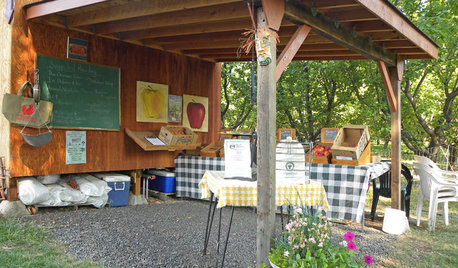



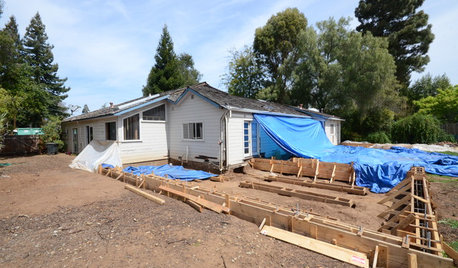







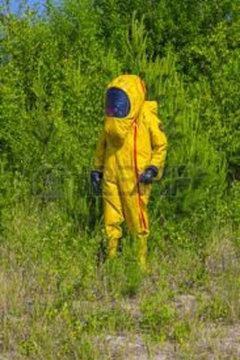
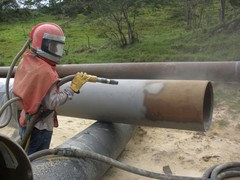
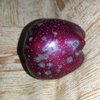
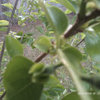
drew51 SE MI Z5b/6a